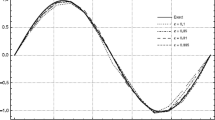Abstract
In this paper, we are interested in a time-dependent control parameter identification for a stochastic diffusion equation. First, we analyze the ill-posedness of the inverse problem by deriving the regularities of the solution to the direct problem in the sense of expectation. With the first moment of the realizations of average data in some sub-domain, we prove the existence and uniqueness of the identification problem. Then, the mollification regularization method is taken to regularize the inverse problem and the a prior convergence rate of the regularized solution is derived. Next, an inversion algorithm which can be paralleled is proposed to solve this inverse problem. Several numerical experiments are presented to show the efficiency of the inversion algorithm.










Similar content being viewed by others
References
Aihara S, Bagchi A (1989) Infinite-dimensional parameter identification for stochastic parabolic systems. Stat Probab Lett 8:279–287
Al-Hussein AR (2005) Strong, mild and weak solutions of backward stochastic evolution equations. Random Oper Stoch Equ 13(2):129–138
Brezis H (2011) Functional analysis, Sobolev spaces and partial differential equations. Springer, New York
Brunner H (2017) Volterra integral equations an introduction to theory and applications. Cambridge University Press, Cambridge
Curtain RF, Falb PL (1971) Stochastic differential equations in Hilbert space. J Differ Equ 10:412–430
Da Prato G (1983) Some results on linear stochastic evolution equations in Hilbert spaces by the semigroups method. Stoch Anal Appl 1:57–88
Da Prato G, Lunardi A (1998) Maximal regularity for stochastic convolutions in \(L^p\) spaces. Atti Accad Naz Lincei Cl Sci Fis Mat Natur Rend Lincei Mat Appl 9:25–29
Davie A, Gaines J (2001) Convergence of numerical schemes for the solution of parabolic stochastic partial differential equations. Math Comput 70:121–134
Dehghan M (2005a) Parameter determination in a partial differential equation from the overspecified data. Math Comput Model 41(2–3):196–213
Dehghan M (2005b) Identification of a time-dependent coefficient in a partial differential equation subject to an extra measurement. Numer Methods Partial Differ Equ Int J 21(3):611–622
Dehghan M, Tatari M (2006) Determination of a control parameter in a one-dimensional parabolic equation using the method of radial basis functions. Math Comput Model 44(11–12):1160–1168
Du Q, Zhang TY (2002) Numerical approximation of some linear stochastic partial differential equations driven by special additive noises. SIAM J Numer Anal 40:1421–1445
Evans LC (2010) Partial differential equations. American Mathematical Society, Providence
Feng X, Li P, Wang X (2020) An inverse random source problem for the time fractional diffusion equation driven by a fractional Brownian motion. Inverse Probl 36:045008
Fu S, Zhang Z (2021) Application of the generalized multiscale finite element method in an inverse random source problem. J Comput Phys 429:110032
Gyöngy I (1998) Lattice approximations for stochastic quasi-linear parabolic partial differential equations driven by space-time white noise I. Potential Anal 9:1–25
Gyöngy I (1999) Lattice approximations for stochastic quasi-linear parabolic partial differential equations driven by space-time white noise II. Potential Anal 11:1–37
Jentzen A, Kloeden PE (2009) The numerical approximation of stochastic partial differential equations. Milan J Math 77:205–244
Kruse R (2014) Optimal error estimates of Galerkin finite element methods for stochastic partial differential equations with multiplicative noise. IMA J Numer Anal 34(1):217–251
Liu D (2003) Convergence of the spectral method for stochastic Ginzburg–Landau equation driven by space-time white noise. Commun Math Sci 1:361–375
Liu F, Khan M, Yan Y (2018) Fourier spectral methods for stochastic space fractional partial differential equations driven by special additive noises. J Comput Anal Appl 24:290–309
Lü Q (2012) Carleman estimate for stochastic parabolic equations and inverse stochastic parabolic problems. Inverse Probl 28:045008
Mohebbi A, Dehghan M (2010) High-order scheme for determination of a control parameter in an inverse problem from the over-specified data. Comput Phys Commun 181:1947–1954
Murio DA (1993) The mollification method and the numerical solution of ill-posed problems. A Wiley-Interscience Publication, New York
Murio DA, Guo L (1990) Discrete stability analysis of the mollification method for numerical differentiation. Comput Math Appl 19(6):15–26
Niu P, Helin T, Zhang Z (2020) An inverse random source problem in a stochastic fractional diffusion equation. Inverse Probl 36:045002
Prato D, Zabczyk J (1992) Stochastic equations in infinite dimensions. Cambridge University Press, Cambridge
Shamsi M, Dehghan M (2012) Determination of a control function in three-dimensional parabolic equations by Legendre pseudospectral method. Numer Methods Partial Differ Equ 28:74–93
Shivanian E, Jafarabadi A (2018) An inverse problem of identifying the control function in two and three-dimensional parabolic equations through the spectral meshless radial point interpolation. Appl Math Comput 325:82–101
Walsh JB (1986) An introduction to stochastic partial differential equations. Springer, Berlin
Yan Y (2004) Semidiscrete Galerkin approximation for a linear stochastic parabolic partial differential equation driven by an additive noise. Bit Numer Math 44:829–847
Yan YB (2005) Galerkin finite element methods for stochastic parabolic partial differential equations. SIAM J Numer Anal 43(4):1363–1384
Yang L, Dehghan M, Yu JN, Luo GW (2011) Inverse problem of time-dependent heat sources numerical reconstruction. Math Comput Simul 81(8):1656–1672
Yoo H (2000) Semi-discretization of stochastic partial differential equations on R1 by a finite-difference method. Math Comput 69:653–666
Yousefi SA (2009) Finding a control parameter in a one-dimensional parabolic inverse problem by using the Bernstein Galerkin method. Inverse Probl Sci Eng 17:821–828
Yuan GH (2017) Conditional stability in determination of initial data for stochastic parabolic equations. Inverse Probl 33:035014
Zolfaghari R (2013) Parameter determination in a parabolic inverse problem in general dimensions. Comput Methods Differ Equ 1(1):55–70
Zou GA (2018) Galerkin finite element method for time-fractional stochastic diffusion equations. Comput Appl Math 37(4):1–22
Acknowledgements
This work is supported by National Natural Science Foundation of China (12061008, 11861007,11761007), Natural Science Foundation of Jiangxi Province of China (20202BABL201004).
Author information
Authors and Affiliations
Corresponding author
Additional information
Communicated by Antonio José Silva Neto.
Publisher's Note
Springer Nature remains neutral with regard to jurisdictional claims in published maps and institutional affiliations.
Rights and permissions
About this article
Cite this article
Ruan, Z., Hu, Q. & Zhang, W. Identification of a time-dependent control parameter for a stochastic diffusion equation. Comp. Appl. Math. 40, 201 (2021). https://doi.org/10.1007/s40314-021-01598-0
Received:
Revised:
Accepted:
Published:
DOI: https://doi.org/10.1007/s40314-021-01598-0




